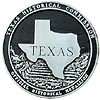(1827-1914) In Mexican War at age 19. Got M.D. at Louisville, Ky. In 1853 settled 2 miles from here. Home was clinic-hospital for young and old, rich and poor of area. As Civil War surgeon, he took scarlet fever. Sent home, he got well, joined frontier regiment. (In this war, for each combat death, 2 died of disease.) Confederate doctors had many problems with drug supply, surgical tools, horse-drawn ambulances and hospitals. Instruments had to be bought in Europe (shipped through naval blockage) or captured from the foe. Drugs came in by blockade-runner or were brought from North by ladies who hid them on the person: in Pompadours, bustles, petticoats. Scarcities led to use of dogwood, willow and poplar bark tea as substitute for quinine. Mullein and other wild herbs were medical substitutes. Garden poppies were milked for opium. Sutures were made of horsehair softened by boiling or from silk cloth ravelings. Female nurses were used for first time in army hospitals. This was first was to use anesthetics. Amputations left severed limbs stacked like wood around the field hospitals. Ambulances seemed never at hand for casualties; many died awaiting aid. Till the atom bomb, the Civil War was history's bloodiest.
This page last updated: 7/15/2008 |
Dr. Joseph M. Pound Historical Marker Location Map, Dripping Springs, Texas
|
|
Related Themes: Texas C.S.A., Texas Confederate States of America, Confederacy
Explore other
Texas Confederate Historical Markers.
|


